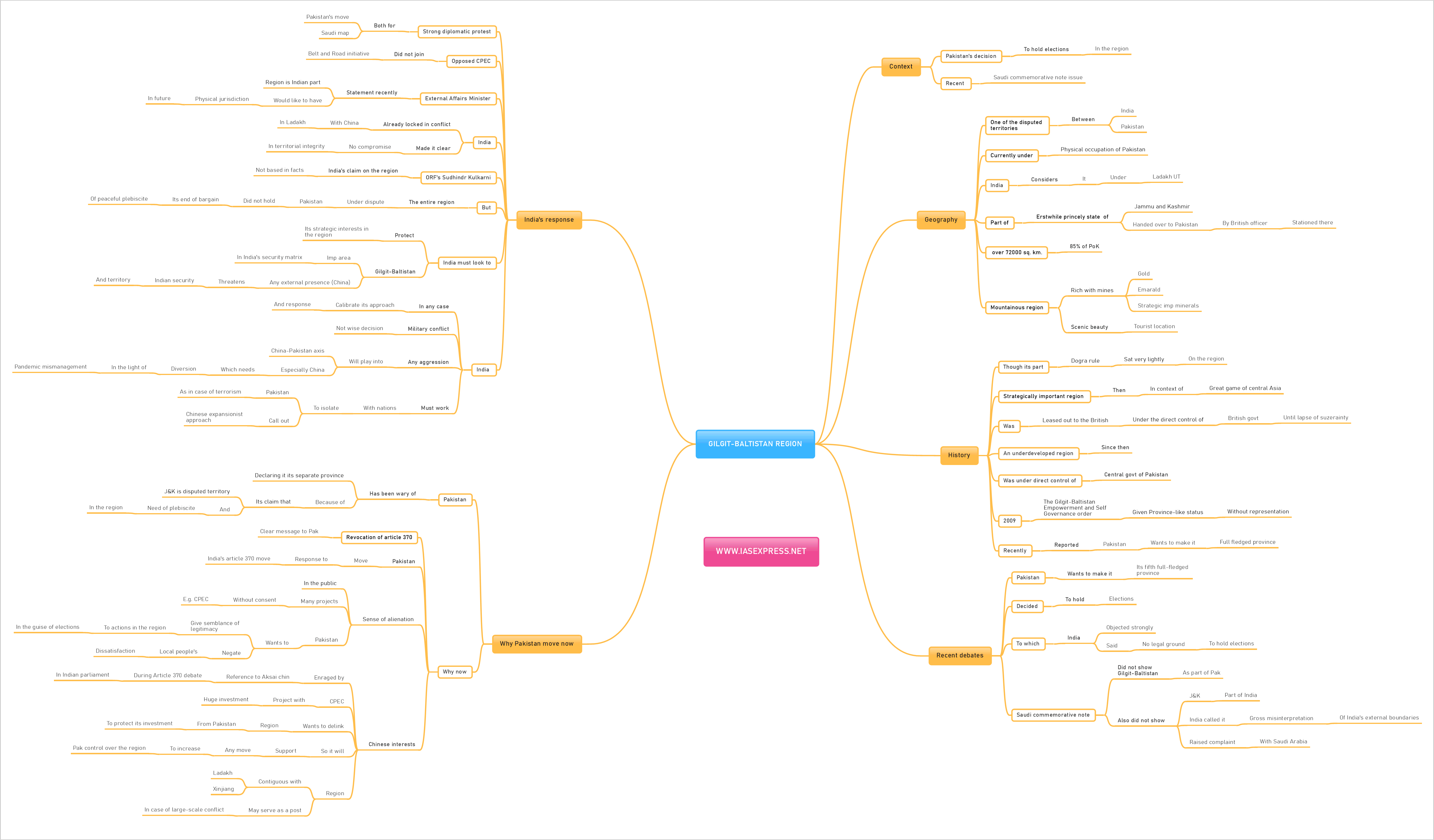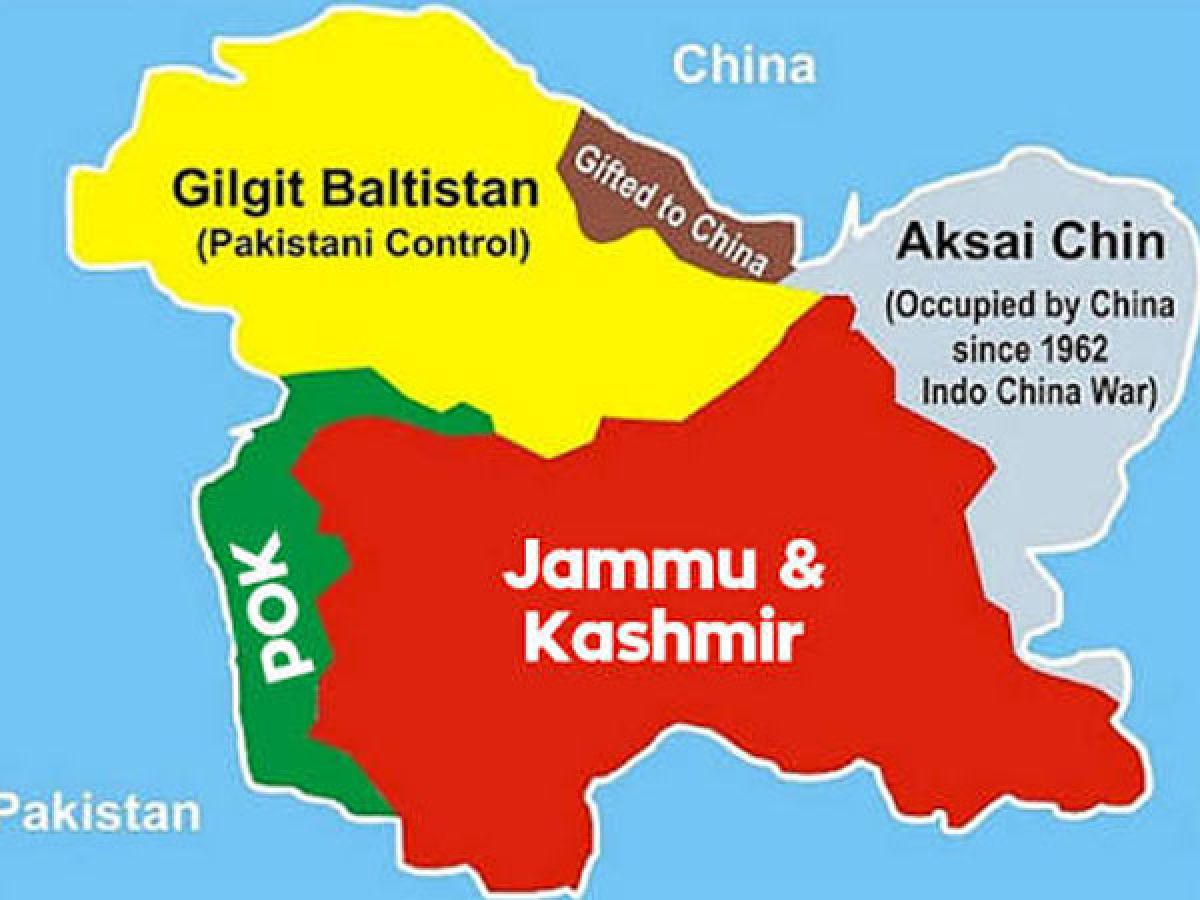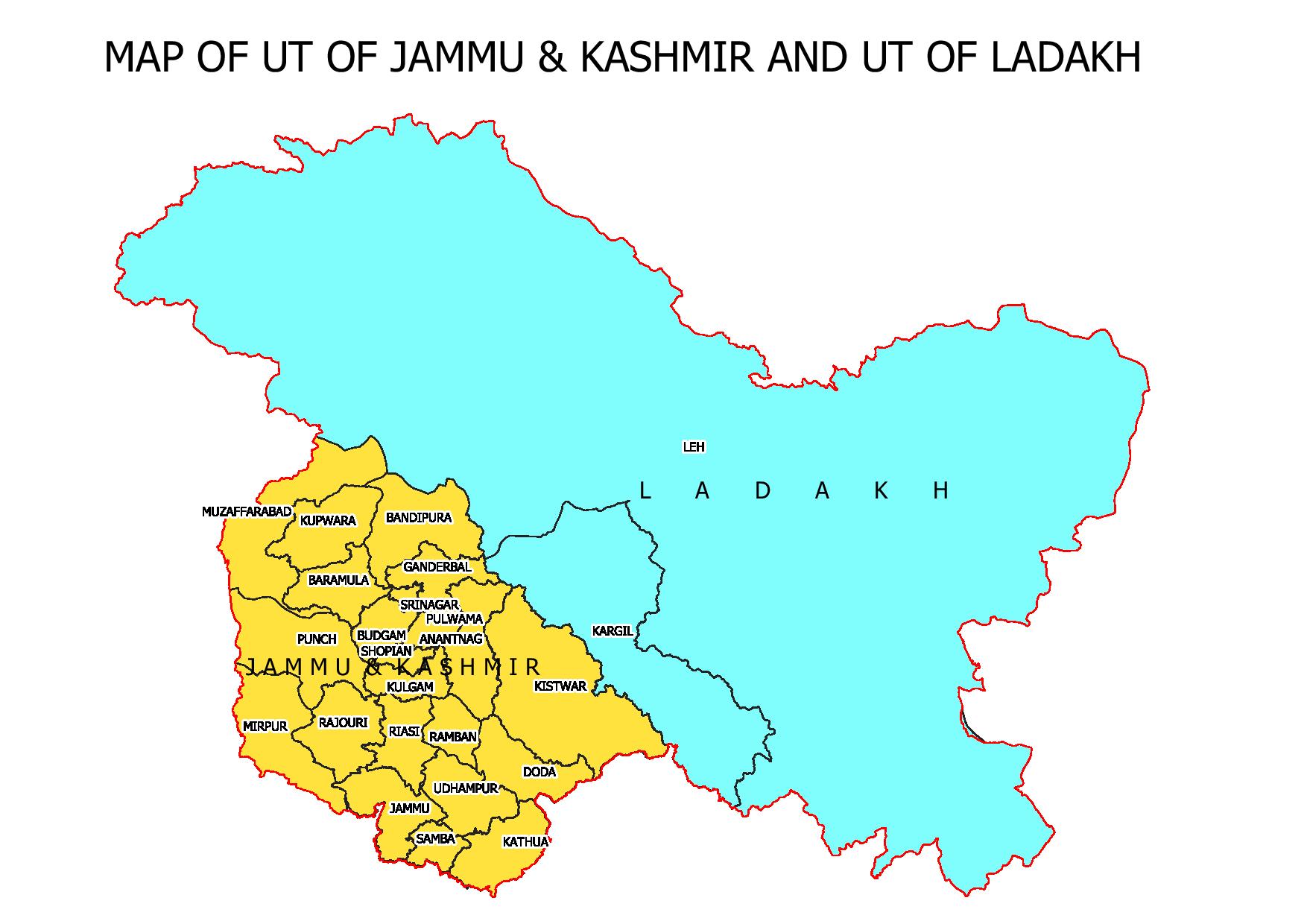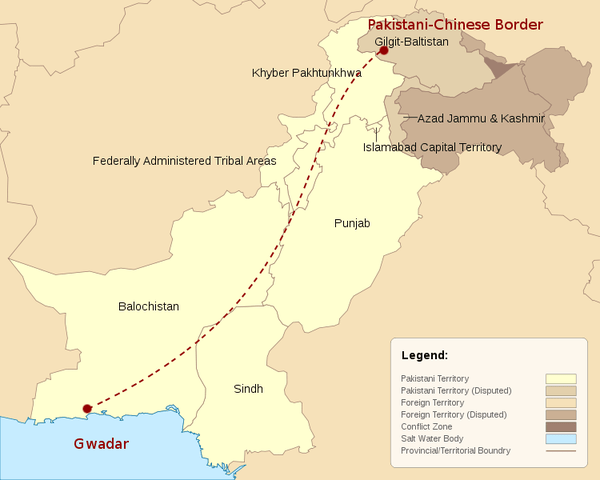Gilgit-Baltistan and India’s sovereign and strategic interests
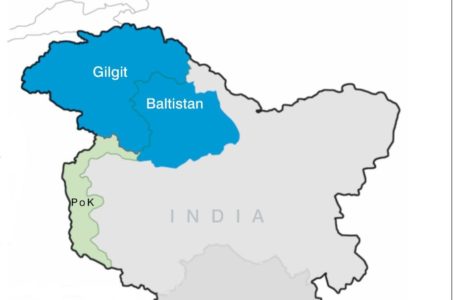
From Current Affairs Notes for UPSC » Editorials & In-depths » This topic
IAS EXPRESS Vs UPSC Prelims 2024: 85+ questions reflected
India-Pakistan relations remained strained due to the issue of the Jammu and Kashmir region. The recent Pakistani decision to hold elections in the region has brought the region again in the news. The area and its importance with respect to Pakistan and China is the topic of discussion in this article.
Gilgit Baltistan: The Geography
- Gilgit Baltistan is one of the disputed territories of India currently under the physical occupation of Pakistan. It is one of the two parts along with a part which Pakistan calls Azad Jammu and Kashmir.
- The territory was part of the erstwhile princely state of Jammu and Kashmir which was handed over to Pakistan in 1947 by the actions of a British officer.
- It has an area of over 72000 sq. km. and consists of 85% of the PoK. Pakistan governs it as a centrally administered area. It was earlier known as Northern Area in Pakistan.
- India considers it as its sovereign territory and a part of Ladakh union territory.
- One of the most mountainous regions in the world that is rich with mines of gold, emerald, and strategically important minerals, and is known for its extraordinary scenic beauty, diversity, and ancient communities and languages, Gilgit-Baltistan is largely an underdeveloped region.
History of Gilgit Baltistan
- Though It was a part of erstwhile Jammu and Kashmir, the Dogra rule sat very lightly on this region.
- Gilgit particularly was a strategically important region in the context of the great game of central Asia.
- It had been leased out to the British by the Maharaja and was under the direct control of the British government until the lapse of suzerainty.
- The local British army, the Gilgit Scouts, switched allegiance to Pakistan after the Accession of Jammu and Kashmir to India.
- The region has been an underdeveloped one and a sense of alienation prevails in the people.
- It has witnessed sporadic protests against Islamabad due to loss of land and livelihood due to mega projects in the region.
- In 2009, Pakistan issued the Gilgit-Baltistan Empowerment and Self Governance order whereby the name was changed from Northern areas to Gilgit-Baltistan. The region was given Province-like status without representation in the Pakistani parliament.
What have been the recent debates around Gilgit Baltistan?
- Recently, Pakistan has decided to elevate the region’s status to that of a full-fledged province. If done, it will be Pakistan’s fifth province.
- Also, it decided to hold elections in the Gilgit Baltistan region. India strongly objected to this decision and held that the elections in the region have no legal ground.
- India holds that the entire territories of the UTs of Jammu and Kashmir and Ladakh have been and are an integral part of India. Gilgit-Baltistan is considered to be under the Ladakh Union Territory under the new arrangement.
- Recently the debate was again flashed in the news when the new commemorative Saudi currency the part was not shown as a Pakistani province.
- It is to be noted that the world map in the currency also does not show Kashmir as Indian territory and the External Affairs Ministry has voiced its concerns and called its gross misinterpretation of our sovereign territory.
Why Pakistan is making it a fifth province now?
- There are multiple reasons why Pakistan is making it a separate province now. Pakistan as discussed above has been wary of declaring it its separate province till now because of its claim that J&K is disputed territory and its future must be decided by a plebiscite among all its inhabitants.
- First, the revocation of article 370 by India has sent a clear message to Pakistan about India’s intentions. India maintains now that the only discussion remains is that of terrorism sponsored by Pakistan.
- Pakistan’s imminent move, transforming Gilgit -Baltistan’s de facto status into a de jure one, is a clear
riposte to the Indian decision. - Second, there has been a sense of alienation in the public and many projects that are undergoing including the China-Pakistan Economic Corridor (CPEC) in the region have little consent of the locals. By giving it elections, Pakistan wants to give its actions in the province a semblance of legitimacy. Pakistan thinks it will also help negate dissatisfaction among the people of the region.
- Third, there is a huge Chinese interest in the region due to investments in CPEC. In view of India’s continuing claim to the area, Beijing is interested in delinking Gilgit-Baltistan formally from Kashmir so that its investment does not remain hostage to the possibility of another round of India-Pakistan
hostilities over Kashmir. - Also, Gilgit-Baltistan is very important for China because the region is contiguous to Ladakh as well as Xinjiang and could act as a strategic post against India if a major conflict erupts in Ladakh which has been under tensions due to India’s tough stance against its infiltration.
- China is also enraged by the references of Aksai chin during the article 370 debates in the Parliament. It will wish to give it back to India by hurting India’s interests in the region.
What could be India’s response to the current move?
- India has already expressed its strong protests to holding of elections in the region. It considers the region as its sovereign territory.
- It has also voiced its concerns about the CPEC projects and has not taken part in China’s Belt and Road initiative because of the furthering of CPEC and India’s sovereignty issues.
- Indian External Affairs Minister has expressed in the past that the region is Indian part and India would in the future like to have physical jurisdiction over it.
- India is locked in a tussle with China in the Ladakh region already and the government has made it clear that it will not compromise India’s territorial integrity and sovereignty.
- ORF’s Sudhindra Kulkarni suggests that India’s claim on the region stems from the same expansionism that it accuses China indulging of. He says that the region has accepted to go with Pakistan and we must respect that decision.
- But any such decision ought to happen by a free plebiscite as was decided under the UN guidance during the initial days. As Pakistan did not hold its side of the Bargain, India ought to look for its strategic security.
- The region apart from being part of India is a strategic location through which China can surround India through Land. It has already tried in the oceans through Its string of Pearls approach.
- In any case, India must calibrate its approach and respond carefully. As a peace-loving nation, India does not support war as a solution to critical issues.
- Plus, as India and the world already reeling under the pandemic and economic slowdown, it is not a wise decision to go on an aggressive posture.
- Any aggression will play into the China-Pakistan nexus and China, since the pandemic handling fiasco, is in the need of issues that could divert attention from its mishandling of the pandemic.
Conclusion
The decision of Pakistan to give Gilgit-Baltistan the status of province and hold elections is on the predicted lines. What India needs to do is a meticulous assessment of capabilities and engage with the world to let them know about Pakistan’s misadventures supported by Chinese expansionism. India has successfully gathered world attention towards Pakistan when it comes to terrorism The FATF actions recently is a proof of that. India must continue to isolate Pakistan and China in world affairs and at the same time be prepared to protect its sovereignty.
Practice Question for Mains
What is the significance of Gilgit-Baltistan in the strategic calculations of India? Discuss in the context of Current Events. (200 words)
If you like this post, please share your feedback in the comments section below so that we will upload more posts like this.
